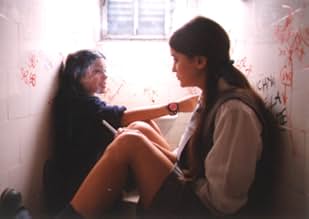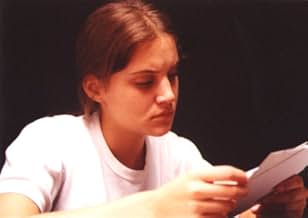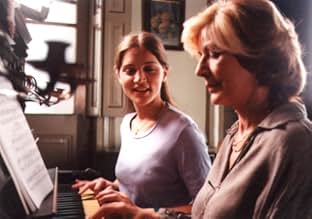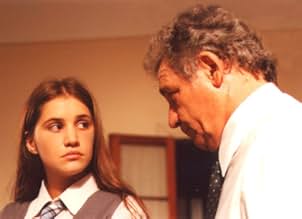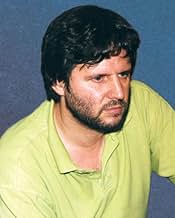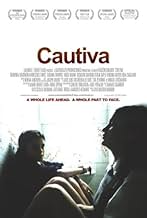Füge eine Handlung in deiner Sprache hinzuCristina's life is thrown into turmoil when she is suddenly escorted from her strict Catholic school in Buenos Aires and told that she is really Sofía Lombardi, the daughter of activists who... Alles lesenCristina's life is thrown into turmoil when she is suddenly escorted from her strict Catholic school in Buenos Aires and told that she is really Sofía Lombardi, the daughter of activists who disappeared in the '70s. Questioning everything she once thought true, Cristina embarks o... Alles lesenCristina's life is thrown into turmoil when she is suddenly escorted from her strict Catholic school in Buenos Aires and told that she is really Sofía Lombardi, the daughter of activists who disappeared in the '70s. Questioning everything she once thought true, Cristina embarks on a journey to find her true identity. Meeting others like herself, the young girl soon di... Alles lesen
- Auszeichnungen
- 5 Gewinne & 13 Nominierungen insgesamt
Empfohlene Bewertungen
Set in a period about ten years before its release, but dealing with issues of the Argentine dictatorship and disappearances from the late 1970s, this is a remarkably realistic and important look at one girl's astonishing involvement with the worst of it.
And if it sometimes is terribly linear in its storytelling, following this girl's realizations one after another (and her emotional burden as it grows and grows), the movie is still so convincing and sad and filled with national (Argentine) guilt it is totally riveting. Anyone interested in the horrors of Latin American dictatorships (left and right wing) and in the victims and survivors, this is a must-see.
Anyone else just interested in the plight of a single sixteen year old girl in a whirlwind of suspicions and lies and a few seemingly tender sympathizers, and see her cope and rise above and maybe, in fact, find a small amount of truth for herself, this is also really rewarding. You might find parallels in similar South American films such as "Machuca" but there is also a weird resemblance to many touching holocaust films that center on the plight of children whose identities get changed and whose histories are disrupted. Not to mention the tragedy of parents killed by cruel governments.
The filming here is really good but never something you'd notice (except one brief dream scene). What you will notice is the gravity and depth of the lead girl's performance. Barbara Lombardo was only 14 for filming (unlike a lot of movies where older girls play younger parts) and she alone makes the movie poignant and serious.
Oddly, this is officially a 2005 movie with its original Spanish title, and yet it gets listed here as "Captive" with a 2004 date. There is a lot left unsaid here, but in a way that's sufficient. It makes you want more.
Is there any worse thing than what happens here? I can't think of more than one (murder, in all its forms). I think even rape is "less bad"! Before turning this into a "moral philosophy", let me point at the scenes I liked most: 1) When Sofía and her expressive Spanish friend have this important talk about life, surrounded by soccer. Now as before, quenching everything that matters. The "paralelism" is challenger indeed! 2) Having Ives's "The unanswered question" as a musical score when... (I can't say more!) 3) Final scene (aerial take, Handel?) 4) The shower scene, between the two now women, "naked" in more than one sense 5) The brawl between the Quadris and Sofia. An one moment, Pablo starts treating Sofia as a stranger, almost an enemy. Suddenly, her "dear daughter Cristina" is dead, even before he hits her. (maybe a bit predictable I guess) 6) (you may laugh) "The nightmare". It made me realize true horror is not what Hollywood sells us, it's opening a door into the unknown (in her grandma's or aunt's house) and finding a glimpse of a life frozen in time (her dead mother's). The film luckily avoids many pitfalls. Has only one very unbelievable moment, when a nun's teen escapes from Tribunales, from the same savvy cops who reduce the also hard boiled Pablo Quadri. Tribunales' zone is very WELL FILMED, feels absolutely real to somebody like me who's hanged around there very often. Retiro, the trains, both schools... It's a very Argentine film! By the way, found it great how she "downgraded" economically from her rather posh house in the suburbs to her grandma's "dark old house" & derelict Citroen! The contrast between the nun's school, which is not luxurious but looks like when compared to the truly depressing state school!
I was surprised about the performances! Have to say I didn't expect much from this film, for a) I don't like Argentine cinema b) the subject is normally a sign of a tsunami of clichés c) didn't have much faith in Lombardero. When I saw "Hugo Arana" I feared the worst :) I had to gulp my prejudices, they both acted surprisingly subduedly, without overemphasis. I had my "lesson", they taught it to me. I would have liked to know what was being played during the film, I loved the usage of classical music throughout the film (not in just a couple of broken scenes). My kudos to the director, of whom I knew nothing, and who (thanks IMDb!) has been a "sound editor" in mainstream American cinema! Well, I hope he continues to surprise us!
Wusstest du schon
- WissenswertesA statement at the end of the film reads "Those responsible, except for a few cases of house arrest, are free." This changed on July 5, 2012, when the first sentences for baby theft from political prisoners during the 1976-1983 "dirty war" were handed down. The longest went to former leader Jorge Videla, who was found criminally responsible for overseeing the systematic theft of babies, and given the maximum sentence of 50 years in prison.
Top-Auswahl
Details
Box Office
- Bruttoertrag in den USA und Kanada
- 16.259 $
- Eröffnungswochenende in den USA und in Kanada
- 2.220 $
- 12. Nov. 2006
- Weltweiter Bruttoertrag
- 16.259 $
- Laufzeit
- 1 Std. 55 Min.(115 min)
- Farbe
- Sound-Mix


